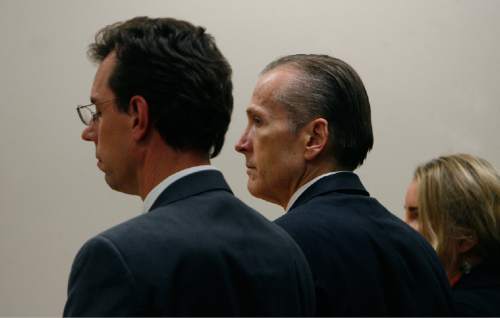This is an archived article that was published on sltrib.com in 2016, and information in the article may be outdated. It is provided only for personal research purposes and may not be reprinted.
It has been over a year since Martin MacNeill was sent to prison for killing his wife in 2007, and the former doctor and lawyer has been appealing the case ever since.
MacNeill, now 56, filed a notice that he would appeal the murder conviction in September 2014, the same month that a Utah County judge sentenced him to spend a 15-years-to-life prison term in the Utah State Prison for Michele MacNeill's April 11, 2007 death.
His appellate attorneys argued in a filing submitted in June to the Utah Court of Appeals that the testimony of several key witnesses was tainted during MacNeill's November 2013 trial.
But Utah County prosecutors responded in court papers last week, saying they presented "ample evidence" to prove MacNeill had drugged his wife and drowned her in a bathtub in their Pleasant Grove home. They asked the appeals court to let stand the jury's convictions of first-degree felony murder and second-degree felony obstruction of justice.
Tainted testimony? • In their filing, MacNeill's attorneys argue he should get a new trial because prosecutors allegedly tainted the testimony of two important witnesses. The first was a federal inmate who served time with MacNeill after he was convicted of an unrelated identity theft case.
That inmate testified that MacNeill confessed to him that he drugged Michele MacNeill and drowned her. But MacNeill's attorney argues that the inmate was not truthful about a deal he received in exchange for testifying, and claimed his testimony was influenced because he watched media reports covering the weeks-long trial before he took the stand.
But prosecutors responded that while the inmate had "credibility problems," MacNeill's trial attorney made the jury aware of these issues when the inmate was cross-examined.
MacNeill's attorneys also argued that the testimony of the defendant's daughter, Ada MacNeill, was influenced by her older sister, Alexis Somers, who believed their father killed their mother. Ada, then 6, found her mother unconscious in the bathtub in 2007, but was not allowed to testify at trial because the judge had ruled that her sister's questioning about how their mother was found may have tainted Ada's memory.
Instead, an interview at the Children's Justice Center was played for jurors — a recording that prosecutors say remedied any claims of tainted testimony because the interview was done before Somers asked her any questions.
Claims of prosecutor misconduct • MacNeill's appellate attorneys further claim that prosecutors withheld information from trial attorneys, including that MacNeill's son, Damian MacNeill, had expressed "homicidal ideations," based on his alleged Twitter postings about murder. They claim that MacNeill's attorneys should have been told about this, because it could have offered an "alternate perpetrator" if they jury believed Michele MacNeill was murdered.
Prosecutors said in their response that they did not deem the tweets relevant because never believed the son could be a suspect in the woman's homicide.
MacNeill's appellate attorneys also claimed that his trial attorneys discovered thousands of pages of evidence that was not handed over to the defense, but was given to an expert witness for the prosecution. The appellate attorneys wrote this was "illustrative of the overall failure and bad faith of the prosecution." After the evidence was discovered, trial attorneys asked that the county attorney's office be removed from the case — a request that the trial judge denied.
At MacNeill's 2013 trial, prosecutors weaved a narrative that Martin MacNeill's bad or odd behavior — including the growing seriousness of his affair with a woman named Gypsy Willis, his insistence that his wife have a face-lift, asking that extra medications be prescribed to her and his reaction to his wife's death — all added up to murder.
Martin MacNeill used an alibi defense at trial, arguing that he was at work when Michele MacNeill died.
There have been no court dates set in the appellate case, according to court records. MacNeill's first parole hearing will not be held until 2052.
Twitter: @jm_miller





